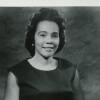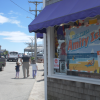Tessa Bailey, a titan of steamy romance, is a New York Times–bestselling author with hundreds of thousands of followers across her social media accounts. She’s been writing books for a decade, but saw an explosion in success with the release of her 2021 novel “It Happened One Summer” about a Hollywood “It girl” who falls for a gruff fisherman in the Pacific Northwest.
Bailey wrote the sequel to "It Happened One Summer" after her husband got sick with COVID-19, and writing was a comfort to her during the pandemic. She thinks her books also became a comfort to readers, too, during that time of isolation and uncertainty.
“I think we were missing human interaction,” Bailey said. “We were missing those moments of angst and romance that we're all supposed to experience at certain times in our life. I think this became a way of getting those feelings, experiences, experiencing those feelings when we couldn't do it in real life.”
The sale of romance novels has been soaring. According to the market research group NPD BookScan, in 2022, romance novels led the print book growth category with sales volume reaching nearly 19 million units. The genre hasn’t reached those levels since 2014. Novelists say social media and changes in the genre have helped make romance books more popular with readers.
Bailey, the Long Island–based author, said when she first started writing, there was a stigma attached to the romance genre. Not only were readers afraid of going to the register to buy a romance novel, but she says they likely were getting judged by their peers for their reading choices.
She credits part of the success of her books to “BookTok,” a community of readers and authors on TikTok. The #BookTok hashtag boasts more than 100 billion views where people share the books they enjoy, hate and can’t stop talking about.
“Now there’s this unapologetic sort of, ‘We like this and we are not afraid to tell you what we want and what we like, and we’ll talk about it on social media in front of billions of people — sort of with no shame,’” she said.
@sarahsreads TB if you see this, just know you have me in a chokehold #booktok #sarahsreads #bookish #bookclub #bookworm #reader #romancebooktok #tessabailey #bookrec ♬ Wii Shop Channel - McTweet
Vermont-based Rochelle Bilow’s debut romance novel “Ruby Spencer’s Whisky Year,” which is coming out on Valentine’s Day, chronicles a food writer who decides to move to a small town in the Scottish highlands for a year to write a cookbook. Bilow thinks the genre should be taken seriously, but also doesn’t mind if her book is a lighter read.
“We do not vilify people who are watching light television or movies that make them feel good,” she said. “But for some reason, we have this bizarre requirement that all books have to be deeply educational, academic reading experiences, and sometimes you just want to read or watch or eat something that makes you feel happy. And there is nothing wrong with that.”
Bilow wrote her novel in January 2021, after she had just gone through a breakup. Her goal was to write something that felt hopeful — which the romance genre guarantees with its key component of a happy ending.
“Having the parameters of a ‘happy ever after’ makes it feel like a safe place to do that work,” she said. “Which is why I think these novels are so immensely successful right now, because the rest of our lives feel so chaotic and uncertain that we know, ‘OK, I’m not going to completely check out when I read this book — like I’m still going to feel feelings, I’m still going to question things — but I know that it’s all going to be OK as I do that.’”
Bailey also believes the happy ending is what makes romance books so special. Her latest novel, “Secretly Yours,” released on Feb. 8, is likely to resonate with readers under amorous circumstances.
“Readers can open themselves up to the gamut of emotions without the fear of being, you know, smacked across the face at the end of the book and feeling terrible,” she said.

Jenn McKinlay, who is based in Scottsdale, Arizona, thinks the romance genre has grown because it has become more diverse and inclusive than ever. She’s been writing books for more than two decades, and her upcoming book features a character with dyslexia who hates reading, but falls in love with a librarian. To better accommodate neurodivergent readers, “Summer Reading” — set on Martha’s Vineyard — will have a font and formatting that are designed to be more reading friendly to dyslexic people.
She thinks it's important that everyone can see themselves reflected in romance. She has multiple family members who have struggled with learning to read and have dyslexia.
"As someone who always depended on books to get me through the hard times, it's been a life journey of watching the people closest to me not have that and really seeing through their eyes how the world is truly unfriendly to non-readers," McKinlay said.
"For some reason, we have this bizarre requirement that all books have to be deeply educational, academic reading experiences, and sometimes you just want to read or watch or eat something that makes you feel happy."Rochelle Bilow, romance novelist
Jessica Martin, who resides in North Andover, wrote “For the Love of the Bard,” set in the fictional Shakespeare-obsessed New Hampshire town of Bard’s Rest. (Its sequel, “The Dane of My Existence,” is out in July.) She thinks the genre in the past was often very narrow and formulaic, but now reflects more diverse stories.
“People got the impression that romances are dumb because it’s always about women settling down,” she said. “Now, these women are young professionals. They’re interested in other women, they're interested in people who don't identify with a gender. It's for everybody. They just got smarter and funnier and savvier and they reflect people. So we have characters of all different body sizes and colors.”
Bailey said the dynamics in romance novels have changed as well: women are getting more agency than ever.
“Consent is like a huge part of romance that needs to be on the page and needs to be clearly defined,” she said. “And I think it's really sexy. You know, I think we've made it into this really sexy thing and it's so necessary, as well.”
“A romance is about a character learning to love themselves. The romance is between the character and themselves, and they just finally meet someone who is a lens they can see themselves through,” McKinlay said. “With all this diversity, I think people are finally catching on. It's not between a guy swooping in like Prince Charming and making everything hunky-dory. It's someone coming in who gets you, who really sees you and helps you see yourself.”








